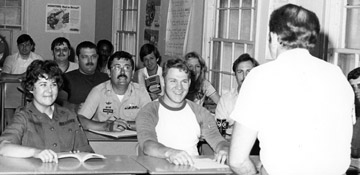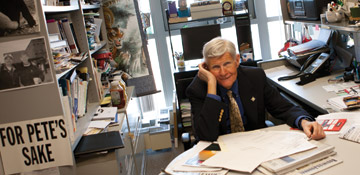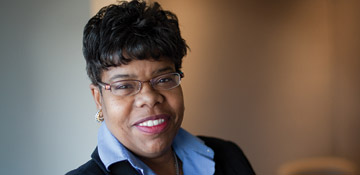Alumni Profile: Jennifer Morrison, M.S. ʼ08
Category: Alumni

photography: Nichol Jones
From UB to Afghanistan, an alumna makes lives healthier and happier—one person at a time.
From a very young age, Jennifer Morrison, M.S. ’08, was concerned with the well-being of others. At just 5 years old, she made an agreement with her father that if he quit smoking, she would run with him every day. Today, Jennifer still enjoys running—and her father has never smoked again.
So it’s no surprise that in 2007, as a graduate student, she founded UB’s Wellness Center. As part of the larger facility now known as Campus Recreation and Wellness, the center provides programs that promote physical, social, environmental, emotional, intellectual and spiritual health—including an anti-smoking plan.
It was through her work at the center that she met her future husband (and UB’s assistant director of intramurals and sports clubs), Dustin Fisher. Though they were acquaintances while she attended UB, it wasn’t until she and Dustin reconnected at an alumni happy hour that sparks flew. In May 2011, she returned to the gym once again for their wedding reception. “We could’ve had [it] anywhere,” she says. “However, the gym is symbolic to us—it connected our lives.”
Before she arrived at UB, Morrison worked with the Peace Corps in Nicaragua, where she noticed that the aid efforts of other organizations sometimes devolved into mere handouts. “In some ways, [they] did more harm than good,” she says, attributing the problem to a lack of communication between organizations and volunteers. Morrison saw the need for more thoughtful and structured communication and hoped an eventual M.S. in Negotiations and Conflict Management would help her facilitate that change.
Now, as the employee relations manager at Washington, D.C.-based Chemonics International, she leads the Staff Care program, which assists employees working in war zones abroad. The program provides resiliency training, monitors the mental well-being of Chemonics’ workforce and assists with the organizational effectiveness of the company’s projects with the U.S. Agency for International Development.
Morrison is also involved in crisis management. Her most trying moment came after a bombing wounded and killed numerous members of Chemonics’ Afghan staff, and she had to attend to the needs of the team members there, those at the home office and the families of those killed. “There was a lot of emotion,” Morrison says, and she admits that she is not unaffected. “It can be hard to always separate work from home.”
But ultimately her job is worth it, she says. “It’s great to have someone come to me crying but leave smiling—whether through me listening or addressing simple needs like good food and water. I guess it’s sort of like raising kids—we’re all scared, mad, tired, hungry—but at the end of the day, if I’ve made someone’s life just a little better, it’s really rewarding.”
WebExtras

Alumni Profile: Jennifer Morrison, M.S. '08
Learn more about Jennifer Morrison, M.S. ʼ08.




